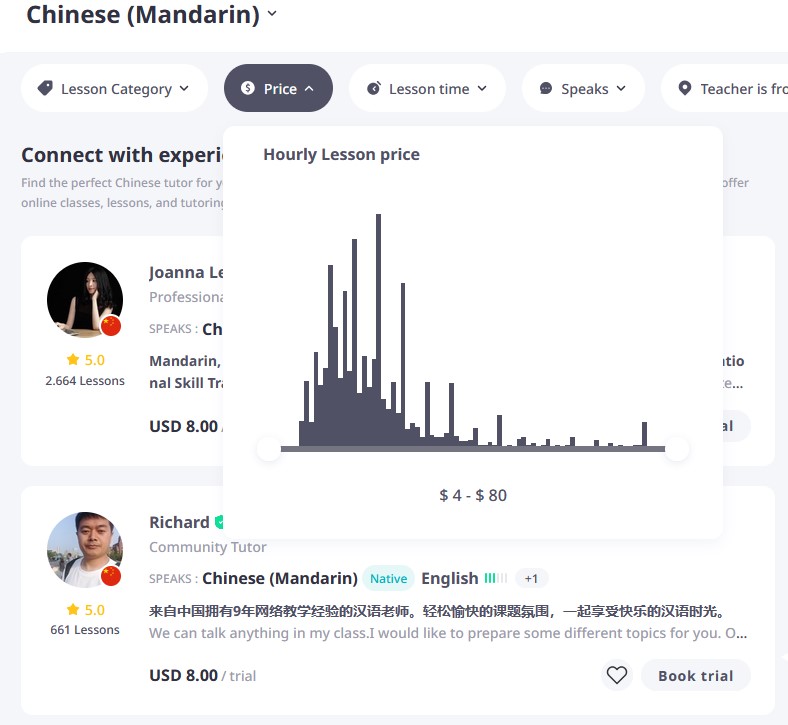How to find online Chinese lessons that are truly worth your time and money? In this blog, I’ll give you 9 practical tips to help you choose Chinese lessons without regrets.
Booking online Chinese lessons without proper research can lead to wasted time, money, and a frustrating learning experience. Not all programs are created equal: some may have unqualified instructors, poor teaching methods, or lack of curriculum structure. Without checking reviews, credentials, and teaching styles, you risk choosing a program that doesn’t match your learning goals or needs. Taking just 10 to 20 minutes to compare options ensures you find a Chinese course tailored to your language level and preferred learning style. Here are nine things to consider.
1. Your goal / 目标
The first question has to be: what is the goal you want to reach by taking Chinese lessons? Do you want to pass the next HSK exam, fluently communicate with your Chinese colleagues or simply survive in a Chinese-speaking environment? Maybe you’re struggling with particular problems like tones & pronunciation, vocabulary gaps or fluency; and you want to smooth away these difficulties. In some cases, it makes sense to break it down a bit more:
In which context do you need Chinese language skills?
Which skills are most important to you (speaking, listening, writing, reading)?
Do you want to learn Chinese in a more formal education style or are you looking for a native speaker or tutor to practice with?
Which ‘key learnings’ you’d like to take away (buying train tickets or holding a meeting in Chinese for example)?
If you can answer these questions more or less accurately, you know what kind of Chinese lessons to look for.
2. Your budget / 预算
The next big thing and often neglected topic is your budget for lessons. What are you willing to pay for an online (or offline) lesson or session? On average you should expect a class to cost between $10 and $40, depending on factors like the duration, size of the class and number of lessons you’ve booked. In a previous post about popular tutoring platforms I found out that with $250 you can book between 10 to 40 Chinese lessons. Chinese language schools like GoEast Mandarin tend to have a higher price per lesson, but – on the other hand – might offer a more professional curriculum. If you’re lucky and your company covers the costs, you don’t have to worry about this point.
3. Schedule / 时间表
After tackling the budget, you have to make sure that the lessons fit within your schedule. Will the session(s) take place on a weekly or daily basis? Would you rather have a short period of concentrated Chinese classes or stretch them out over an extensive period of time?
4. Reviews / 评论
Take some time to read reviews on Trustpilot and similar platforms. Or, in case your booking a tutor, on the tutoring platforms themselves which have their own ways of ranking their tutors for teaching quality and customer satisfaction. Reading reviews is the best way to find out what other learners liked, disliked and what to expect in general. Especially self paying learners tend to be very honest about their experience.
5. Free trial class / 免费试听课
Always book a free trial class before committing to anything. Most language schools offer this anyway, so if you have the time and energy, book several trial classes from different providers. This is probably the best way to make an informed choice, not unlike test-driving a car before you buy it. After all, Chinese lessons can be quite an investment.
Definitely pay special attention to things like professional and experienced teachers, motivating class atmosphere, the teaching methods used and student speaking time. Especially, in one-on-ones, where you spend lots of time directly with the teacher or tutor, make sure you have a good connection.
Mentioning ‘connection’: also check the platform and technology if you’re taking online lessons to ensure your internet connection, sound and video are working fine, since there’s nothing more annoying than loosing time due to technical problems.
6. Qualified teachers / 合格的教师
I already mentioned this, because it’s so important: make sure that your teacher or tutor is qualified and experienced in teaching Chinese as a second language. In another post, I went in more detail about what to expect from a good Chinese teacher. Ideally, they should be native speakers of Chinese and have a background in teaching.
Obviously, there’s a huge range between a native speaker who offers ‘Chinese lessons’ on Facebook and someone with a formal background in teaching Chinese as a second language and 5+ years of experience. Experience and qualification are reflected in the price per lesson, so this is actually a budget-related matter too. In one sentence: Go for the best teacher your budget allows for.
7. Format & curriculum
Check if the curriculum is appropriate for your current level of Chinese and that it covers the topics and skills that truly matter to you. What’s more, depending on your budget and preferences, you have to make a choice between one-on-ones, small or larger classes. The smaller the classes, the more speaking time you get (but the less interactions and input from other learners). Larger classes tend to be more ‘economical’.
8. Good support & booking policies
If you’re signing up for lessons, not only teaching quality counts, but also having a good support team outside of class. It’s good to have a go-to person for any technical questions that might arise about certifications, billing or something else.
What’s more, if you book – say – 30 lessons, it makes sense to check the booking and refund policy, in case you can’t attend a lesson last minute. For teachers and schools to be able to work and plan, usually a deadline applies after which a lesson can’t be rescheduled without a negative consequence (loosing one lesson for example). Since life is unpredictable and it could happen that you have to cancel previously scheduled lessons, it’s worth checking under which conditions a refund is possible.
10. 加油 and have fun
Obviously, taking lessons should be an enjoyable part of your Chinese language journey, it should be both motivating and challenging. So 加油 and go for it!


